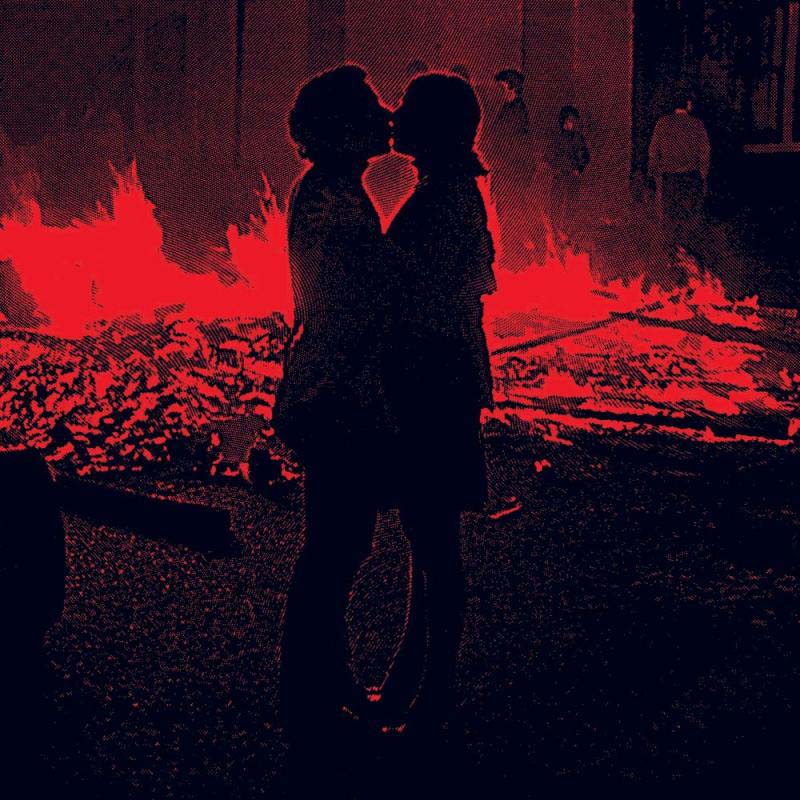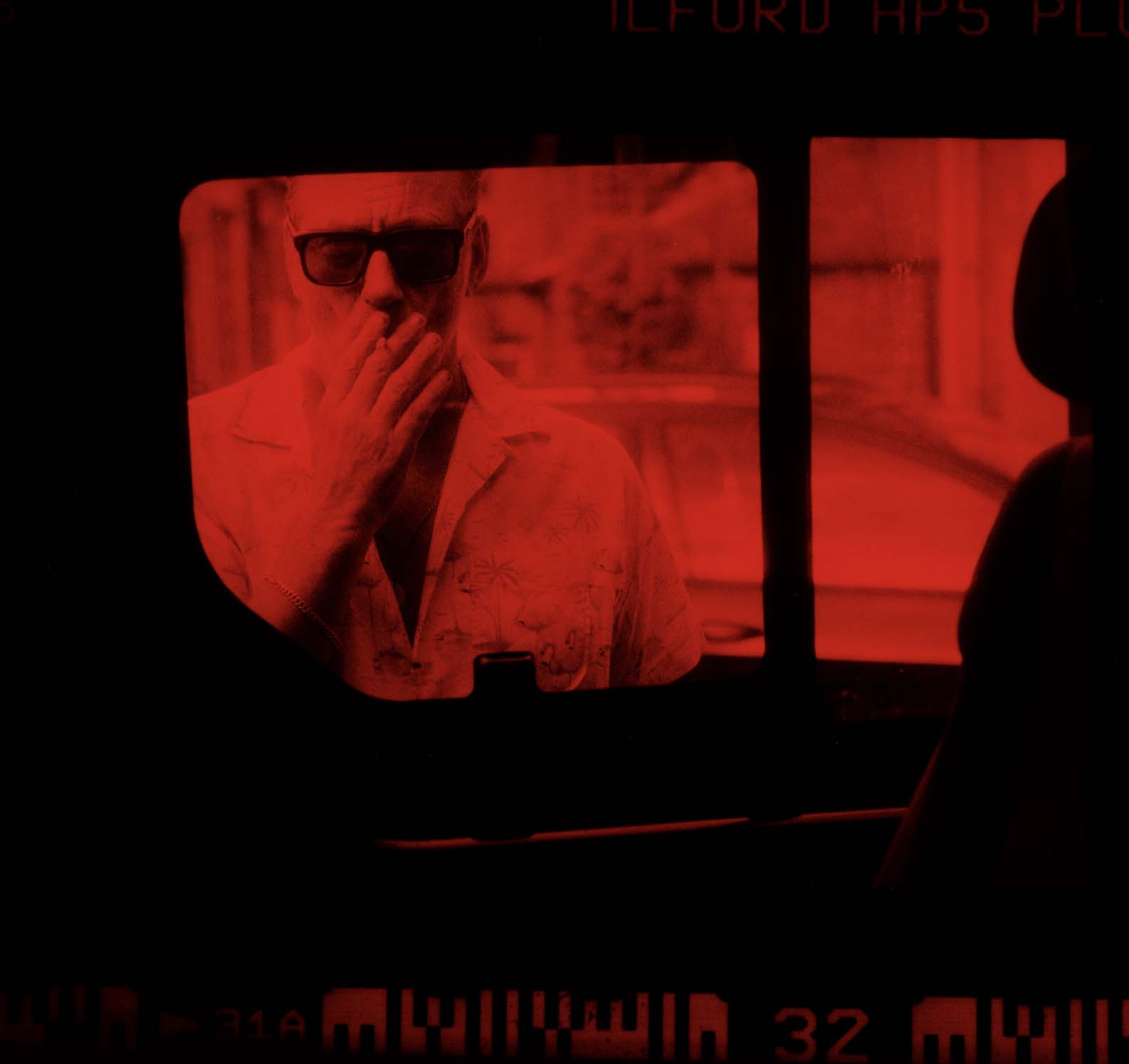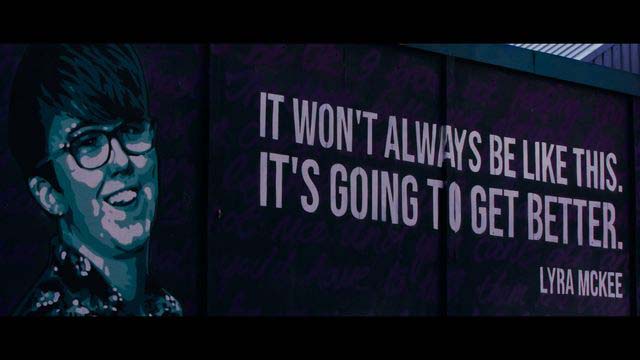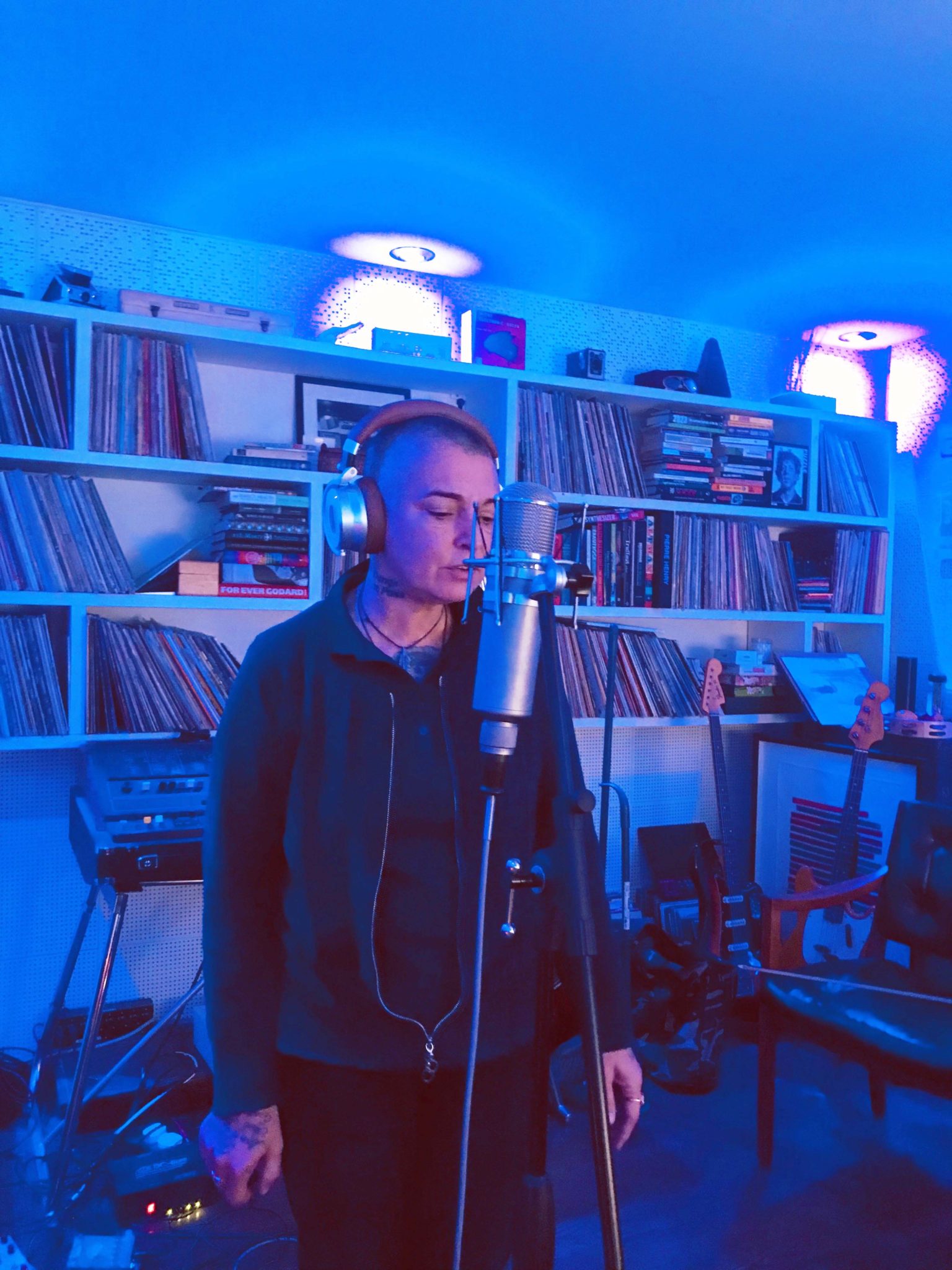- Music
- 05 Dec 23
David Holmes: "I have the feeling that we're at the start of something much bigger and much scarier"

Not content with producing the A-List likes of Noel Gallagher and Sinéad O’Connor, David Holmes has released a new album, Blind On A Galloping Horse, which isn’t afraid to confront the world’s ills head on. In a similarly zero punches pulled interview, Holmer draws parallels between Gaza and Troubles-era Northern Ireland and talks Andrew Weatherall, Lyra McKee, Van Morrison, Eric Cantona - and lots more - with Stuart Clark.
If ever a song was made for the times we’re living in it’s ‘When People Are Occupied Resistance Is Justified’, the ten-minute epic which kicks off David Holmes’ first solo album since 2008, Blind On A Galloping Horse. With its Manic Street Preachers-esque title, Idles levels of righteous anger and sonic positioning somewhere between OK Computer and Screamadelica, it’s headfuckery of the most essential kind and the perfect riposte to virtually everything you’ll read nowadays in Britain’s right-wing rags.
”’When People Are Occupied Resistance Is Justified’ was actually a comment on immigration but just as equally applies to Gaza,” Holmes reflects when we track him down to his Belfast lair. “If you keep 2.3 million people locked up in a cage and have automatic AI weapons with cameras pointing in the direction of these poor Palestinian people, a lot of whom are refugees, they’re going to fight back.
”What’s happening in Gaza at the moment isn’t a war – it’s fucking genocide. Nearly four thousand babies and children killed and then you hear, ‘Oh yeah, we’re doing everything we can to avoid civilian casualties’.”
Clearly emotional, David pauses for a moment before adding: “During The Troubles here, there was huge propaganda and lies told to create fear and hate. Imagine if in the 1970s the British Government had rounded up all the Catholic community, not just those who were interned, and put them into a corner of West Belfast and built a huge cage around the whole thing with armed guards and people being shot indiscriminately. I completely and utterly condemn the murder of any innocents regardless of what religion they are, but if you treat people like vermin, treat them like the scum of the earth, they will, as I just said, fight back.”
Holmes draws further comparisons between Gaza now and the Northern Ireland he grew up.
”When Bobby Sands died during the Hunger Strike and the other nine followed, it led to a massive surge in IRA membership,” he proffers. “Thirteen people were murdered on Bloody Sunday, which is a lot, but thirteen people in fucking Palestine is a quiet day. People were queuing up in Derry to join (the IRA) because they were so angry. They’d seen the indiscriminate shooting of people who were on a Civil Rights march. If that happened in Northern Ireland, what’s going to be happening in the Muslim world? That’s why the IDF are killing babies - they don’t want them to grow up and join Hamas.
”I have no idea what’s going to come off the back of this shit-show, but I have the feeling that we’re at the start of something much bigger and much scarier.”
It’s a sobering thought. What has been underreported, especially in Israel, is the considerable Jewish opposition to Benjamin Netanyahu’s government and the actions currently being carried out by the Israeli Defence Forces.
“The (now former) British Home Secretary, Suella Braverman, stood up the other day and called them ‘hate marches’ - but if you go to the very front of any pro-Palestinian march, you’ll find Jewish people,” Holmer proffers. “I don’t stand with Hamas, I don’t stand with the Israeli Government, I’m on the side of humanity and up until October 7th I think there were 248 innocent Palestinians killed this year, about forty of whom were children. They’re just taking them out. It’s like target practice.”
 David Holmes - Blind On A Galloping Horse
David Holmes - Blind On A Galloping Horse’When People Are Occupied Resistance Is Justified’ ends with an Afghani refugee bemoaning Britain and the United States’ betrayal of his country.
”The Brits and the Americans came in after 9/11, said ‘We’re here to free you from the tyranny of the Taliban and Osama bin-Laden’ and then were suddenly, ‘Right, we’re out of here’,” David reflects. “He adds that he experienced so much racism on the road to Northern Ireland from people whose countries were responsible for him having to leave Afghanistan. It’s actually beautiful because he says Belfast was the first place he’d been where people understood his situation, brought him in and were warm and kind. There’s also audio of a Palestinian ambulance driver on the record, which is from a film a friend of mine made about Gaza. He was saying, ‘I just want the bombs to stop so we can all live’. His life is this never-ending nightmare.”
A CAREER HIGHLIGHT
Another Galloping… standout is ‘Necessary Genius’ which, in similar fashion to Bob Dylan’s ‘Murder Most Foul’, namechecks Samuel Beckett, John Coltrane, Angela Davis, Tony Wilson, Andrew Weatherall, Terry Hall, Nina Simone, Sinéad O'Connor and all the other ‘dreamers, misfits, radicals, outcasts’ Holmes holds dear who are no longer with us.
”Whether it’s Peter Meaden who dressed The Who - he was the ace face Mod in Soho in ‘61/’62 before it became fashionable - or Sinéad, they’re people who mean a lot to me,” David explains. “I could only fit four in, but I mention Rastafarianism, Catholicism, Christianity and the Mighty Allah because if you’ve got a religion that works for you and keeps you on a path, great. I’m not religious at all, but I remember speaking to Sinéad and her telling me that she took the best out of all the different ones and tried to practice what really spoke to her.”
 David Holmes by Steve Gullick.
David Holmes by Steve Gullick.Talking of the aforementioned Mr. Weatherall, Galloping… includes ‘I Laugh Myself To Sleep’, a track that the superstar DJ and producer was working on when he tragically passed away in 2020 and to which Holmer has applied the finishing touches.
“Andrew was very, very proud of that album which is a fucking great piece of work but will probably never come out,” David resumes. “I think he’d like the idea of a mysterious ‘lost’ record that gets talked about down through the years. People in his inner circle have it but it’s not one you’d whore around.
”The reason I chose to do that track is that Galloping… is dedicated to both Andrew and another friend of mine David Anderson, who died a couple of years ago. What I’ve always said in relation to Weatherall is that he transcended being a DJ and a record producer and a remixer and an artist. He was bigger than that. He was sort of like your psychologist, a friend you could always talk to about things. His generosity of spirit was second to none. He didn’t believe in green rooms, he was always out with the people and wanted to talk to you, no matter what your story was. He was deeply inquisitive and one of those who’d read three or four books a week.”
Holmer goes on to recall meeting Weatherall for the first time just before he helped Bobby Gillespie & Co. reinvent themselves on Screamadelica.
“It was in a club in London in 1990. He’d just played one of the greatest sets I’d ever heard in my life, so I ran up to him, asked if he’d like to come to Belfast and Andrew straight away said, ‘Yes!’ This was when The Troubles were in full swing but he gave me his phone number. I rang him mid-week at 7.30pm, was told to call back after Coronation Street, did so and we sorted all the details out. He came over, blew everyone’s mind and became a cultural icon in Belfast because he played here so much.”
If it’s a big beat stomper you’re after, look no further than Blind On A Galloping Horse’s flagship single, ‘It’s Over, If We Run Out Of Love’, which is a D. Holmes/N. Gallagher co-write.
“The working title of that was ‘Nervous Acid’ because the backbone of the music was inspired by an old Chicago dance track which was called that. Noel didn’t use it on the album we did together, so I said, ‘Do you mind if Raven has a go at it?’ and he was like, ‘Yeah, go ahead.’ So, I gave it to her and fucking hell! I was talking to Gallagher on the phone and he’s going, ‘God man, give me her number!’ and I’m like, ‘Not yet!’ I love Noel to bits, he’s a top man, super nice and funny as fuck. People don’t realise how ridiculously talented he is. As a guitar-player, the sounds he gets are incredible and he’s a genius with pedals and linking them up.”
Asked why it’s been fifteen years between solo albums, Holmer says: “After I did The Holy Pictures in 2008, I felt like I didn’t have anything to say - or would ever have something to say - but that changed with Brexit. From the moment the vote was announced, it just smelt rotten to the core or, as the album says, ‘A blind man on a galloping horse could see it was a terrible idea.’ It’s well-documented that Boris Johnson, who was actually incredibly pro-European, used it as a way to divide and conquer.
“When asked what he wanted to be when he grew up, Boris said, ‘King!’ It’s that sort of privileged entitlement, a bully who never had to get his hands dirty. Quite unloved as well, I imagine. Anyone who goes to Eton should never be let near the gates of Downing Street because they’re brought up with this superiority complex and don’t have any empathy or a conscience.”
When not piecing together Blind On A Galloping Horse or working with Sinéad O’Connor on her yet to be released No Veteran Dies Alone album – see below- David Holmes has been adding to his list of soundtrack credits, which includes everything from Oceans Twelve and Thirteen and ‘71 to The Fall and Killing Eve.
”I did the music for This Is England, which was about the catastrophic failure of Boris Johnson and his government during Covid, and kept wanting to cave the fucking screen in because I was so angry,” Holmer laughs mirthlessly. “I also did the Lyra film. I never met Lyra, but was incredibly moved by who she was and what she was trying to do. She was just a really great human being who had a conscience and wanted to bring needle-in-a-haystack investigative journalism back. Alison Miller, the director who’s become a really good friend of mine, asked me to do it and though there wasn’t a budget - I didn’t get paid a penny - it was something I had to do. It didn’t get a BAFTA nomination, but just won a Best European Documentary award in Berlin. So, yeah, that was a bit of a career highlight.”

MOST IMPORTANT COLLABORATION
Top of his current wish-list is none other than Manchester United legend Eric Cantona who made his singing debut earlier this month in Dublin’s Liberty Hall. And very good he was too.
”The King!” Holmer shoots back. “Football was just something he did and was fucking brilliant at. I’ve a project I’m trying to get off the ground that I have him in mind for. Bobby Gillespie, who’s quite friendly with him, told Eric my idea and he was like, ‘Sure, pass my number on’. So, I’m going to pluck up courage and give Eric Cantona a call.”
While David has managed to work with such A-Listers as Steven Soderbergh, Danny DeVito, U2, Noel Gallagher, Steve McQueen, Primal Scream and Sinéad O’Connor, inevitably there have been ones that have got away.
“I wrote to Van Morrison seven or eight years ago,” he confides, “and said, ‘I think a big part of the greatness in soul music and rhythm ‘n’ blues is the recording. They don’t translate well in a digital world. Part of its magic was just having those people in the room playing together. Great microphones, great amps - everything has a bit of personality. No computers, you know, and I would love to make a record with you using that approach’.”
David half - well, three-quarters - expected to be blanked but, nope, The Man sent word through an intermediary that he’d like to meet.
“It was sort of, ‘Bring him to me!’” Holmer laughs. “So, I went to the Culloden Hotel in Holywood where he does his business and had a series of three meetings with him, all really good. A studio I’d chosen in Los Angeles had been booked, and then at the last meeting a record company dude he’d brought in from England asked, ‘Will the musicians be of Van’s generation or younger?’
”I said, ‘I think it’d be better to use what I call the modern day Wrecking Crew - guys in their thirties or forties who are actually better at doing that authentic ‘70s playing than a lot of the older guys are’. And I never heard from Van again! I’ve since found out that he was over in San Francisco working with a lot of old blues guys in an analogue studio going straight to tape, so he basically loved the idea but went and did it himself.
”I was happy, though, just for the experience - and to have my Van Morrison story! After the second meeting, Van drove me home. He had this big pile of letters on his front-seat, which I imagine were legal documents. I was in the back and he was talking to me via the mirror and playing a compilation CD I’d made for him. It was just totally surreal!”
Despite the superstar competition, David Holmes’ most important collaboration of late is his one with Raven Violet, who handles all the Blind On A Galloping Horse vocal duties.
She’s the daughter of Keefus and Jade, the other two-thirds of our band UNLOVED,” Holmer concludes. “I knew Raven when she was a 14 or 15-year old with loads of attitude. I’d say, ‘Why don’t you come on down to the studio? I’m sure you’ve got a beautiful voice, you could do some harmonies’ and she’d just grunt at me. Eventually, after much coaxing, she did and I was right - and then some. The tone: you’ve either got that or you haven’t. She’s not religious but wanted to get baptised and asked me to be her Godfather, which brought our friendship into a different sphere. How I describe Raven is ‘Michelle Phillips with attitude’. It’s that Californian West Coast vibe - only ramped up. She’s 28 now and continues to blow me away every time she steps up to the microphone.”
Blind On A Galloping Horse is out now on Heavenly.
NOTHING COMPARES TO HER
As regular Hot Press readers will know, David Holmes spent several years working with Sinéad O’Connor, on what turned out to be her last album, No Veteran Dies Alone.
Sinéad would travel up to his Belfast studio every couple of months with whatever new songs she'd written and stay until they were in the can.
Speaking in our special Sinéad tribute issue, Holmer noted that, "She never, ever flinched from raising her head above the parapet, regardless of the flak awaiting her.
"No one else was like her. She just had this extraordinary gift and a huge heart. The dirt underneath her fingernails made her more punk than anybody else who's come from this island."
Recalling the first time he heard Sinéad in his producer's headphones, he said, "Recording-wise, that was my Nina Simone moment."
Read the full interview in our special Sinéad O'Connor Tribute Issue, available from the hotpress.com shop.

RELATED

- Culture
- 17 Jan 22
Primal Scream announce Dublin show on their Screamadelica tour

- Culture
- 13 Aug 21
'I like songs that pull on your heartstrings': Dot Allison

- Culture
- 10 Mar 21
Primal Scream’s Bobby Gillespie announces Tenement Kid autobiography
RELATED

- Culture
- 17 Feb 20
Tributes pour in for Andrew Weatherall

- Culture
- 17 Feb 20
Legendary Producer Andrew Weatherall Passes Away

- Culture
- 16 Dec 25
Live Aid musical to embark on Ireland and UK tour

- Music
- 16 Dec 25
Texas singer-songwriter Joe Ely has died, aged 78

- Music
- 16 Dec 25

